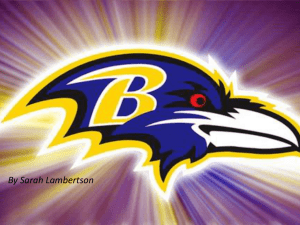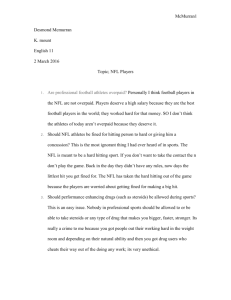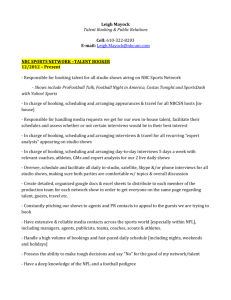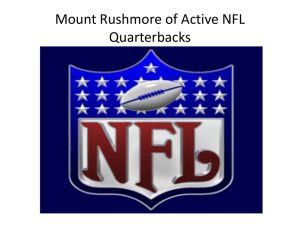NFL Scores Nearly $18 Billion in TV Rights
advertisement
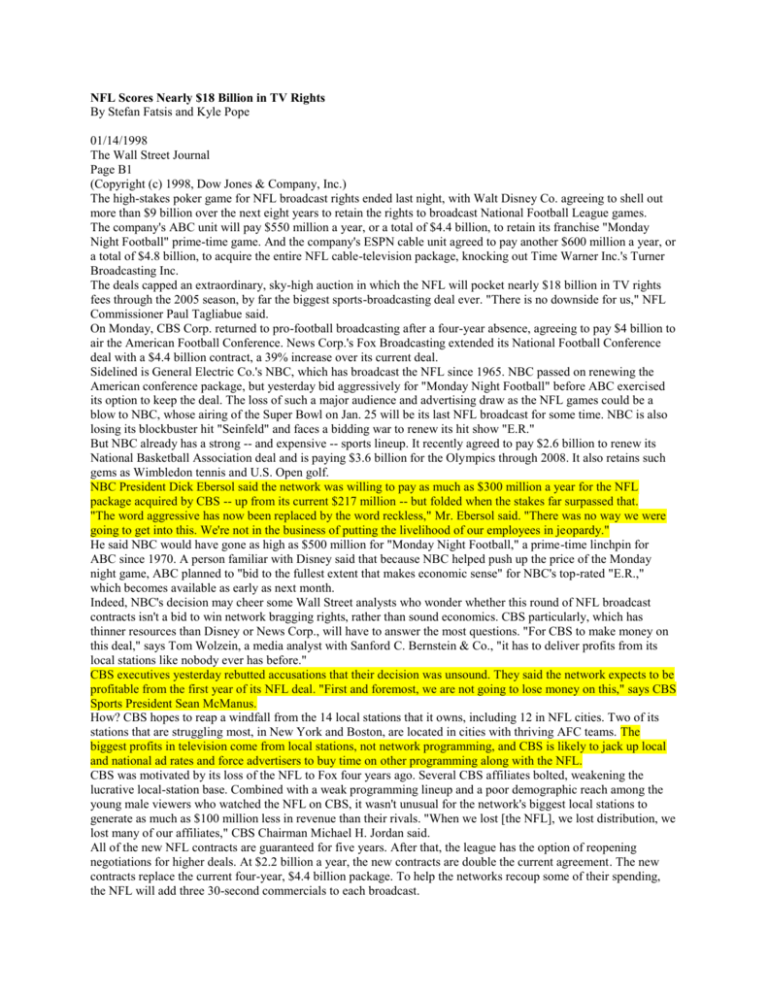
NFL Scores Nearly $18 Billion in TV Rights By Stefan Fatsis and Kyle Pope 01/14/1998 The Wall Street Journal Page B1 (Copyright (c) 1998, Dow Jones & Company, Inc.) The high-stakes poker game for NFL broadcast rights ended last night, with Walt Disney Co. agreeing to shell out more than $9 billion over the next eight years to retain the rights to broadcast National Football League games. The company's ABC unit will pay $550 million a year, or a total of $4.4 billion, to retain its franchise "Monday Night Football" prime-time game. And the company's ESPN cable unit agreed to pay another $600 million a year, or a total of $4.8 billion, to acquire the entire NFL cable-television package, knocking out Time Warner Inc.'s Turner Broadcasting Inc. The deals capped an extraordinary, sky-high auction in which the NFL will pocket nearly $18 billion in TV rights fees through the 2005 season, by far the biggest sports-broadcasting deal ever. "There is no downside for us," NFL Commissioner Paul Tagliabue said. On Monday, CBS Corp. returned to pro-football broadcasting after a four-year absence, agreeing to pay $4 billion to air the American Football Conference. News Corp.'s Fox Broadcasting extended its National Football Conference deal with a $4.4 billion contract, a 39% increase over its current deal. Sidelined is General Electric Co.'s NBC, which has broadcast the NFL since 1965. NBC passed on renewing the American conference package, but yesterday bid aggressively for "Monday Night Football" before ABC exercised its option to keep the deal. The loss of such a major audience and advertising draw as the NFL games could be a blow to NBC, whose airing of the Super Bowl on Jan. 25 will be its last NFL broadcast for some time. NBC is also losing its blockbuster hit "Seinfeld" and faces a bidding war to renew its hit show "E.R." But NBC already has a strong -- and expensive -- sports lineup. It recently agreed to pay $2.6 billion to renew its National Basketball Association deal and is paying $3.6 billion for the Olympics through 2008. It also retains such gems as Wimbledon tennis and U.S. Open golf. NBC President Dick Ebersol said the network was willing to pay as much as $300 million a year for the NFL package acquired by CBS -- up from its current $217 million -- but folded when the stakes far surpassed that. "The word aggressive has now been replaced by the word reckless," Mr. Ebersol said. "There was no way we were going to get into this. We're not in the business of putting the livelihood of our employees in jeopardy." He said NBC would have gone as high as $500 million for "Monday Night Football," a prime-time linchpin for ABC since 1970. A person familiar with Disney said that because NBC helped push up the price of the Monday night game, ABC planned to "bid to the fullest extent that makes economic sense" for NBC's top-rated "E.R.," which becomes available as early as next month. Indeed, NBC's decision may cheer some Wall Street analysts who wonder whether this round of NFL broadcast contracts isn't a bid to win network bragging rights, rather than sound economics. CBS particularly, which has thinner resources than Disney or News Corp., will have to answer the most questions. "For CBS to make money on this deal," says Tom Wolzein, a media analyst with Sanford C. Bernstein & Co., "it has to deliver profits from its local stations like nobody ever has before." CBS executives yesterday rebutted accusations that their decision was unsound. They said the network expects to be profitable from the first year of its NFL deal. "First and foremost, we are not going to lose money on this," says CBS Sports President Sean McManus. How? CBS hopes to reap a windfall from the 14 local stations that it owns, including 12 in NFL cities. Two of its stations that are struggling most, in New York and Boston, are located in cities with thriving AFC teams. The biggest profits in television come from local stations, not network programming, and CBS is likely to jack up local and national ad rates and force advertisers to buy time on other programming along with the NFL. CBS was motivated by its loss of the NFL to Fox four years ago. Several CBS affiliates bolted, weakening the lucrative local-station base. Combined with a weak programming lineup and a poor demographic reach among the young male viewers who watched the NFL on CBS, it wasn't unusual for the network's biggest local stations to generate as much as $100 million less in revenue than their rivals. "When we lost [the NFL], we lost distribution, we lost many of our affiliates," CBS Chairman Michael H. Jordan said. All of the new NFL contracts are guaranteed for five years. After that, the league has the option of reopening negotiations for higher deals. At $2.2 billion a year, the new contracts are double the current agreement. The new contracts replace the current four-year, $4.4 billion package. To help the networks recoup some of their spending, the NFL will add three 30-second commercials to each broadcast. All this occurs as NFL ratings are on the decline, hitting their lowest marks since the National and American pro football leagues merged in 1970. But while overall NFL ratings have tumbled about 33% since peaking in the early 1980s, prime-time ratings on ABC, CBS and NBC dropped a combined 47% over the same period. That lure of guaranteed big audiences is key. ABC more than doubled the fee for "Monday Night Football," but retains its highest-rated prime-time show -- and saves the expense of developing new programming in the slot. ESPN also agreed to more than double the price tag for the Sunday night cable package. Disney plans to brand all of its NFL programming, including the ABC telecasts, with the ESPN name. The contracts have certainly played havoc with TV broadcast valuations. "In the context of what's going on, it's not outlandish," said Michael Trager, chairman of Sports Marketing & Television International Inc. "In the context of reality, all of this is outlandish."

